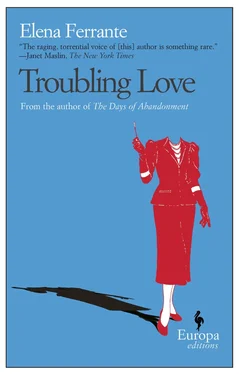Elena Ferrante - Troubling Love
Здесь есть возможность читать онлайн «Elena Ferrante - Troubling Love» весь текст электронной книги совершенно бесплатно (целиком полную версию без сокращений). В некоторых случаях можно слушать аудио, скачать через торрент в формате fb2 и присутствует краткое содержание. Год выпуска: 2006, Издательство: Europa Editions, Жанр: Современная проза, на английском языке. Описание произведения, (предисловие) а так же отзывы посетителей доступны на портале библиотеки ЛибКат.
- Название:Troubling Love
- Автор:
- Издательство:Europa Editions
- Жанр:
- Год:2006
- ISBN:нет данных
- Рейтинг книги:5 / 5. Голосов: 1
-
Избранное:Добавить в избранное
- Отзывы:
-
Ваша оценка:
- 100
- 1
- 2
- 3
- 4
- 5
Troubling Love: краткое содержание, описание и аннотация
Предлагаем к чтению аннотацию, описание, краткое содержание или предисловие (зависит от того, что написал сам автор книги «Troubling Love»). Если вы не нашли необходимую информацию о книге — напишите в комментариях, мы постараемся отыскать её.
This stylish fiction from the author of
is set in a beguiling but often hostile Naples, whose chaotic, suffocating streets become one of the book's central motifs. A story about mothers and daughters and the complicated knot of lies and emotions that binds them.
Troubling Love — читать онлайн бесплатно полную книгу (весь текст) целиком
Ниже представлен текст книги, разбитый по страницам. Система сохранения места последней прочитанной страницы, позволяет с удобством читать онлайн бесплатно книгу «Troubling Love», без необходимости каждый раз заново искать на чём Вы остановились. Поставьте закладку, и сможете в любой момент перейти на страницу, на которой закончили чтение.
Интервал:
Закладка:
I turned to look for my uncle. I saw him in the other car, intent, openmouthed. Polledro, next to him in the crowd, was beating on the glass. Maybe he was trying to attract Caserta’s attention. Or mine. He no longer had the irritating air that I had seen in the shop. He seemed a humiliated and anxious boy, forced to be present behind a window at a spectacle that made him suffer. My gaze went from him to Caserta: I was disoriented. It seemed to me that they had the same red plastic mouth, stiff with tension. But I couldn’t stabilize that impression. The funicular stopped, with a rocking motion, and I saw that the girl moved in a hurry toward the exit. Caserta, as if stuck to her, followed with back arched and legs spread, to the astonishment and nervous laughs of his traveling companions. The young woman jumped out of the car. The old man hesitated a moment, stopped, and looked up. I thought that he was recalled by Polledro’s now frantic pounding. Instead, as if he had always known exactly where I was, he picked me out in the crowd, which was now pointing to him with murmurs of disapproval, and, turning to me with a slightly suggestive look, let me understand that the pantomime he had been enacting had to do with me. Then abruptly he slipped out of the car, like a rebel actor who has decided to stop following the script.
I realized that Polledro, too, was trying to get out. I, in turn, tried to reach the door, but I was too far away and was pushed back by the current of people getting on. The funicular started off again. I looked up and realized that the man from the Vossi sisters’ shop hadn’t made it, either. But Uncle Filippo had.
15
In the faces of the old it’s difficult to trace the lineaments of their youth. At times we can’t even imagine that they had a youth. I realized, as the funicular continued its descent, that a little earlier, with the movement of my gaze from Polledro to Caserta and vice versa, I had composed a third man, who was not Caserta or Polledro. He was a young man, olive-skinned, with black hair and a camel overcoat. That ectoplasm, which immediately dissolved, was the result of a shift of somatic features, as if my gaze had caused an accidental confusion between the cheekbones of Caserta and those of the floorwalker from the Vossi shop, between the mouth of one and that of the other. I reproached myself. I had done too many things that I shouldn’t have: I had started running, I had given into anxiety, my frenzy had been excessive. I tried to calm myself.
A few minutes later the station of Chiaia appeared, a dimly lighted concrete bunker. I prepared to get out but I still felt unsettled. Now, in my head, Amalia was, in her turn, staring at that fanciful somatic composition I had made. I resigned myself. She stood there, demanding, in a corner of the old station of forty years earlier. I arranged her better in the background, as if I were working on a puzzle that was not yet identifiable from its details: only her loosened hair, a dark profile in front of three painted wooden figures that perhaps had been there a little less than half a century earlier, advertising clothes. Meanwhile I exited from the car, practically pushed down the steps by impatient passengers. I felt cold in spite of the warm damp air, like that of a greenhouse or a catacomb.
Now Amalia had definitely appeared in full, young and lithe, in a station that, like her, was no longer there. I stopped to give her time to stand and stare, spellbound, at the figures: perhaps a sophisticated couple with a German shepherd on a leash. Yes. They were of cardboard and wood, six feet tall, less than half an inch thick, with supports behind their backs. I chose details at random to color and clothe them. The man, it seemed to me, wore a jacket and checked pants, a camelhair overcoat, a perfectly fitting felt hat; one gloved hand held the other glove. The woman wore perhaps a dark suit with a long scarf of a blue material with a delicately colored pattern: on her head she wore a hat with feathers, and her eyes were deep-set behind the veil. The dog was sitting on his hind feet, ears pricked, close to his master’s legs. The three of them, looking healthy and content, stood there in the station, which at that time was gray and dusty, and partitioned by a black grating. A few steps away broad shafts of light fell from between the stairs above, making the green (or red?) of the funicular gleam when it slid slowly out of the tunnel in the hill.
I began to descend the stairway toward the bars of the turnstile. The rest happened in a very brief but extraordinarily dilated lapse of time. Polledro took me by one hand, awkwardly, just under the wrist. I was certain that it was he even before I turned. I heard him asking me to stop. I didn’t. He told me that we knew each other well, that he was the son of Nicola Polledro. Then, in case that information wasn’t enough, he added: “The son of Caserta.”
I stopped. I even left Amalia standing in front of those figures, her mouth half-open, white teeth lightly veined by lipstick, hesitating between an ironic comment and an expression of wonder. The wood-and-cardboard couple let themselves be admired with detachment, on the left at the foot of the steps. I, who felt that I was present at her side even though I couldn’t see myself, thought that the couple were images of the owners of the funicular. People who came from far away: they were so anomalous, so out of place, so different in their magical absorption that they seemed from another country. Forty years earlier, I must have considered them a possibility of flight, the proof that other places existed where we could go, Amalia and I, whenever we wanted. I thought certainly that my mother, too, so intent, was studying how to run away with me. But then the suspicion dawned that she was standing there for other reasons: perhaps only to study the woman’s clothes and the way she carried herself. Probably she wanted to re-create them in the clothes she sewed. Or learn to dress that way herself, and stand that way, casually, waiting for the funicular. Now, after many decades, I felt, grieving, that there, in that corner of that station, I had not in any way managed to think her thoughts from within her, from within her breath. Already at that point her voice could say to me only: do this, do that. But I could no longer be part of the cavity that conceived those sounds and decided which ones should sound in the external world and which should remain sounds without sound. This pained me.
Polledro’s voice arrived like a jolt against that grief. The station of forty years earlier gave a shudder. The figures turned out to be of colored dust and dissolved. After many years, clothing and poses of that sort had disappeared from the world. The couple had been removed, along with their dog, as if, after waiting in vain, they had grown annoyed and had decided to return to their castle of somewhere or other. I had trouble keeping Amalia standing in front of that void. Furthermore, a moment before Polledro stopped speaking, I had realized that I was confused, that the dark suit of the cardboard woman and her scarf had been not hers but my mother’s. It was Amalia who dressed in that elegant fashion, so long ago. As if for an appointment that was important to her. Now with her mouth half-open, teeth lightly veined by the lipstick, she was staring not at the figures but at him, the man in the camelhair coat. And the man spoke to her, and she answered, and he spoke to her again, but I didn’t understand what they were saying.
Polledro spoke to me ingratiatingly to force me to listen to him. I looked at him, mesmerized, but I couldn’t manage to pay attention. Under the well-fed features he had the face of his father as a young man, and he was helping me, without wanting to, tell myself about Caserta, who was meeting my mother in the damaged station of Chiaia. I shook my head and Polledro must have thought that I didn’t believe him. In fact it was in myself that I had no faith. He repeated: “It’s me, Antonio, the son of Caserta.” I was realizing that all I really preserved of those figures of wood and cardboard was an impression of foreign lands and unkept promises. They gleamed like newly polished shoes, but without details. They could just as easily have been advertising figures of two men, or two women; there might have been no dog; they could have had a lawn under their feet or a sidewalk; and I couldn’t even remember what they were advertising. I no longer knew. The details that I had unburied — now I was sure of it — did not belong to them: they were merely the result of a chaotic assemblage of clothing and gestures. The only clear thing now was that handsome young face, olive-skinned, with black hair, the features of Polledro the son superimposed on a shadow that had been Polledro the father. Caserta spoke gently to Amalia, holding his son Antonio by the hand, who was just my age; and my mother held me, certainly without being aware of my hand in hers. I recognized Caserta’s mouth, moving quickly, and I saw his red tongue: the frenulum that anchored it kept it from darting toward Amalia more than it already was. I realized that, in my head, the cardboard man of the funicular had worn Caserta’s clothes and that his companion had worn my mother’s. The hat with feathers and veil had traveled far, from some wedding celebration or other, before coming to rest there. I didn’t know the fate of the scarf except that it had remained for years around the neck and shoulders of my mother. As for the suit, it — sewed, taken apart, turned — was the same one that Amalia had worn when she took the train to Rome to celebrate my birthday. How many things pass through time randomly detached from the bodies and voices of persons. My mother knew the art of making clothes last forever.
Читать дальшеИнтервал:
Закладка:
Похожие книги на «Troubling Love»
Представляем Вашему вниманию похожие книги на «Troubling Love» списком для выбора. Мы отобрали схожую по названию и смыслу литературу в надежде предоставить читателям больше вариантов отыскать новые, интересные, ещё непрочитанные произведения.
Обсуждение, отзывы о книге «Troubling Love» и просто собственные мнения читателей. Оставьте ваши комментарии, напишите, что Вы думаете о произведении, его смысле или главных героях. Укажите что конкретно понравилось, а что нет, и почему Вы так считаете.












